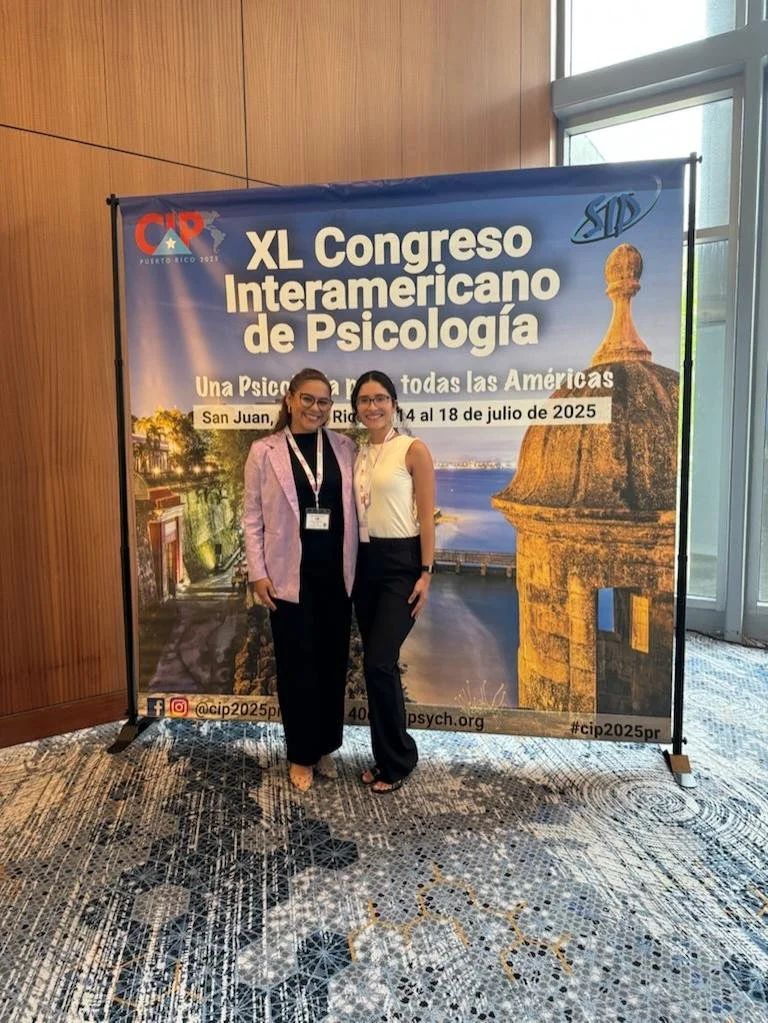LATINX PSYCHOLOGY IN ACTION
Who are we?
Members of the team are undergraduate and graduate students in the School of Counseling and Counseling Psychology at Arizona State University. All PLENA students work under the advisement of and in collaboration with Dr. Cristalís Capielo Rosario. Dr. Capielo Rosario and multiple PLENA students are bilingual and native Spanish speakers.
What is plena?
plena: adjetive: full, complete
Que cubre todos los aspectos de lo que se expresa. That which covers all aspects of what is expressed.
PLENA Research Lab
Our lab names honors Puerto Rican musical tradition and history. Plena, is a musical rhythm created by the genius of Black Africans and Black Puerto Ricans in Ponce, Puerto Rico. Plena was born out of the need to communicate the struggles, social issues, and news of the day using movement, words, and drumming. The rhythm of the panderos (plena drums) and the songs of the pleneros/a/es (singers and drummers) have the power to unify the community to each other and the divine (Duany, 2000). This connection in turn, gives energy to all who participate by creating a space for healing, emotional expression, mobilization, creativity, enjoyment, and relaxation.
PLENA Mission
In this same spirit of our name and the music tradition, our mission as members of the PLENA lab is to conceptualize and disseminate rigorous research that is relevant and connected to issues important to Latinx communities. We want our research to translate into teaching, clinical, service, and advocacy interventions and actions that facilitate community healing, emotional expression, unity, and mobilization.
PLENA Values
Research activities should be accompanied by advocacy, political, organizational, relational, and spiritual actions on behalf of and as a member of the community.
Scholarship by members of PLENA is guided by the principle that ALL scientific activity should translate into advantages, protections, resources, rights, and support for the communities we serve and are part of.
SELECTED PLENA ARTICLES 2020-2025
(Bold type = PLENA Member; * = PLENA STUDENT)
Sanchez, D., Stoto, I. C., Capielo Rosario, C., Genao, G., & Serrano, S. D. (2025). Adapting the colonial mentality scale for Mexican-origin emerging adults. Journal of Counseling Psychology, 72(2), 172–183. https://doi.org/10.1037/cou0000783.
Capielo Rosario, C., Adames, H. Y., *Ramos-Rosado, G., Rodríguez-Muro, N. J., & DeJesús-Sullivan, L. A. (2024). Colonial shadows: Exploring coloniality of being among Puerto Rican immigrants in the United States. Journal of Counseling Psychology. Advance online publication. https://doi-org.ezproxy1.lib.asu.edu/10.1037/cou0000756
Fuentes, M. A., Consoli, A. J., Capielo Rosario, C., Sullivan, L. A. D., & Zelaya, D. G. (2024). Applying critical consciousness through the use of testimonios to rethink Latinx cultural values. Journal of Latinx Psychology. Advance online publication. https://dx.doi.org/10.1037/lat0000260
Capielo Rosario, C., Carlos Chavez, F. L., Sanchez, D., Torres, L., Pituch, K, & *Mattwig, T. (2024). Negative pandemic impacts, food insecurity, and mental health among Puerto Rican youth and adults during the COVID-19 pandemic. Journal of Clinical Child & Adolescent Psychology. Advanced online publication. https://doi-org.ezproxy1.lib.asu.edu/10.1080/15374416.2024.2301775
Capielo Rosario, C., *Mattwig, T., *Hamilton, K., & *Wejrowski, B. (2023). Conceptualizing Puerto Rican migration to the United States. Current Opinion in Psychology, 51, Article, 101584. https://doi.org/10.1016/j.copsyc.2023.101584
Capielo Rosario, C., Adames, H. Y., & Muro-Rodríguez, N. J. (2022). How colonialism blames Puerto Rico for its corruption. Centro Journal 34(2), 75-94.
Capielo Rosario, C., *Faison, A., *Winn, L., Caldera, K., & *Lobos, J. (2021). No son complejos: An intersectional evaluation of AfroPuerto Rican health. Journal of Latinx Psychology, 9(1), 45–64. https://doi.org/10.1037/lat0000183. [Impact Factor: 2.6]
Capielo Rosario, C., Gonzalez, K. A., Abreu, R. L., & Cardenas Bautista, E. (2021). It hurts but it’s the thing we have to do”: Puerto Rican colonial migration. Journal of Latinx Psychology, 9(2), 140–160. https://doi.org/10.1037/lat0000181
Capielo Rosario, C., Abreu, R. L., Gonzalez, K. A., & Cardenas Bautista, E. (2020). “That day no one spoke”: Florida Puerto Ricans reaction to Hurricane María. The Counseling Psychologist, 48(3), 377–406. ttps://doi.org/10.1177/0011000019899382








